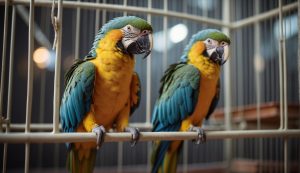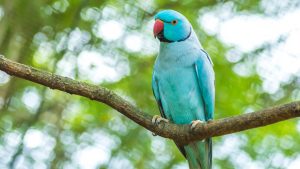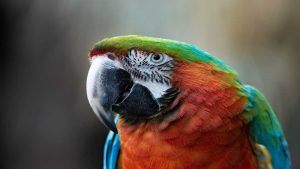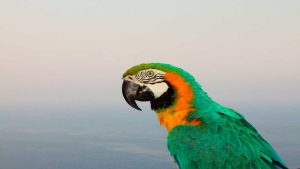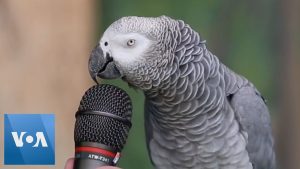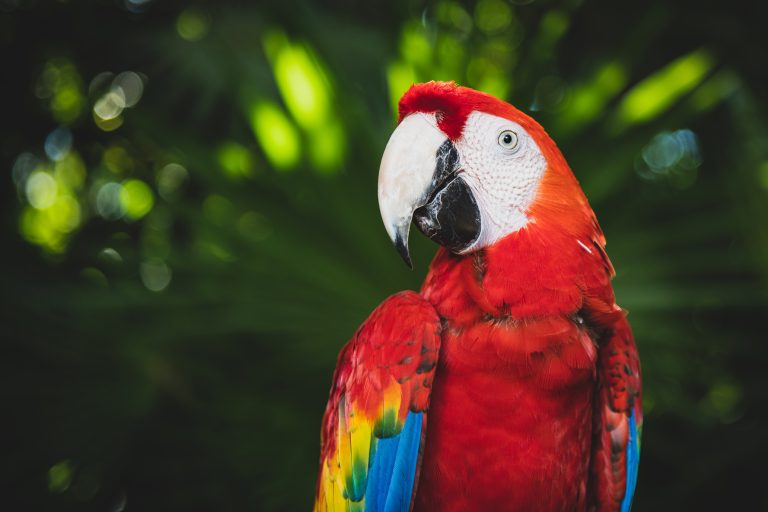Why Is My Parrot’s Beak Turning Black? Expert Answers

Parrots are known for their beautiful and colourful feathers, but have you ever noticed their beak changing colour? If your parrot’s beak is turning black, it’s important to understand why this is happening and what you can do about it.
In this article, we’ll explore the common causes of black beaks in parrots and what you can do to prevent it.
Recognising black beak in parrots is important because it can be a sign of an underlying health issue. While some parrots naturally have black beaks, a sudden change in colour could indicate a problem. It’s essential to monitor your parrot’s beak regularly and seek professional care if you notice any changes.
There are many reasons why a parrot’s beak can turn black, from genetics and age to infections and injuries. By understanding the common causes and taking preventative measures, you can help keep your parrot healthy and happy. Let’s explore this topic in more detail.
Key Takeaways
- Black beak in parrots can be a sign of an underlying health issue and should be monitored regularly.
- Common causes of black beak include genetics, age, infections, and injuries.
- Preventative measures and professional care can help keep your parrot healthy and happy.
Table of Contents
Recognising Black Beak in Parrots
If you have a parrot, you may have noticed its beak turning black and wondered why. In this section, we will discuss the reasons why parrot beaks can turn black and how to recognise this condition.
Causes of Black Beak in Parrots
There are several reasons why a parrot’s beak may turn black. Here are some of the most common causes:
- Injury: If your parrot’s beak has been injured, it may turn black as it heals. This is because the beak is made up of living tissue that can become damaged and discoloured.
- Fatty liver disease: This is a condition that occurs when a parrot’s liver becomes damaged and is unable to function properly. One of the symptoms of this disease is a black beak.
- Stress: When a parrot is stressed, its body produces more melanin, a hormone that gives the beak its colour. This can cause the beak to turn black.
Recognising Black Beak in Parrots
It is important to recognise when your parrot’s beak is turning black so that you can take appropriate action. Here are some signs to look out for:
- Colour change: The most obvious sign of a black beak is a change in colour. If your parrot’s beak is normally a different colour and has turned black, this is a cause for concern.
- Texture: A black beak may also feel different to the touch. It may be rough or uneven, or have a different texture to the rest of the beak.
- Behaviour: If your parrot is showing signs of illness or discomfort, this may be a sign that its beak is turning black. Look out for changes in appetite, energy levels, and behaviour.
In conclusion, a black beak in parrots can be caused by a variety of factors, including injury, fatty liver disease, and stress. It is important to recognise the signs of a black beak so that you can take appropriate action and ensure your parrot’s health and wellbeing.
Common Causes of Black Beak
Parrots have different coloured beaks, including black, green, or light-coloured beaks. If your parrot’s beak suddenly starts changing colour from green or lightly coloured, then you know that something is going on with the bird. Here are some common causes of black beak in parrots:
Diet and Nutrition Related Causes
A poor diet that lacks essential nutrients can cause a parrot’s beak to turn black. Specifically, a lack of vitamin A can lead to the discoloration of the beak. A seed diet is often deficient in vitamin A, so it’s important to provide a balanced diet that includes fruits and vegetables.
Injury and Trauma Related Causes
Injury or trauma to the beak can cause tissue damage or necrosis, leading to the beak turning black. In these cases, it’s important to seek immediate veterinary care to prevent infection and ensure proper healing.
Infections and Diseases Related Causes
Some infections or diseases can cause a parrot’s beak to turn black. Fungal infections, for example, can lead to the discoloration of the beak. Other diseases and conditions that can cause black beak include malnutrition and genetic mutations affecting pigmentation.
It’s important to note that some parrots may naturally have black beaks, and this is not necessarily a cause for concern. However, sudden changes in the colour of the beak should be monitored and evaluated by a veterinarian.
Overall, providing a balanced diet, preventing injury, and seeking prompt veterinary care for infections or diseases can help prevent black beak in parrots.
The Role of Genetics and Age
When it comes to the colour of a parrot’s beak, there are several factors at play, including genetics and age. In this section, we’ll explore these factors in more detail.
Genetic Factors
The colour of a parrot’s beak is largely determined by their species. For example, some parrots have beaks that are naturally black, while others have beaks that are lighter in colour. In some cases, the sex of the bird can also play a role in the colour of their beak. For instance, male parrots may have beaks that lighten in colour as they age, while females may have beaks that remain black.
Ageing and Beak Colour
As parrots age, their beaks can undergo changes in colour. In some cases, this is due to a natural darkening or lightening of the beak as the bird matures. However, there are also other factors that can contribute to changes in beak colour.
One of the most common causes of beak colour changes is stress. When a parrot becomes stressed, their body produces more melanin, which can result in a darker beak colour. In some cases, this can be a sign of an underlying health issue, so it’s important to monitor your parrot’s beak colour and seek veterinary care if you notice any sudden changes.
Another factor that can contribute to changes in beak colour is diet. A diet that is lacking in essential nutrients can cause a parrot’s beak to become discoloured or brittle. Providing your parrot with a balanced diet that includes a variety of fruits, vegetables, and high-quality pellets can help keep their beak healthy and vibrant.
In conclusion, the colour of a parrot’s beak is influenced by a variety of factors, including genetics and age. While some changes in beak colour are normal and nothing to worry about, sudden or drastic changes can be a sign of an underlying issue. By monitoring your parrot’s beak colour and providing them with a healthy diet, you can help keep their beak looking and feeling its best.
Parrot Species and Beak Colour
Parrots are known for their colourful plumage, but did you know that their beaks can also come in a variety of colours? Beak colour can vary depending on the species of parrot, and can even change over time. In this section, we’ll take a closer look at the beak colours of three popular parrot species: Eclectus Parrots, Lovebirds, and Indian Ringnecks.
Eclectus Parrots
Eclectus Parrots are known for their striking sexual dimorphism – males and females have distinctly different plumage. This extends to their beak colour as well. Male Eclectus Parrots have bright orange beaks, while females have jet black beaks. This difference in beak colour is thought to be related to their diet – males eat more fruit and vegetables, which contain more carotenoids that can lead to the bright orange colour.
Lovebirds
Lovebirds are small parrots that come in a variety of colours, but their beak colour is usually black. However, some Lovebirds may have a slightly reddish or pinkish tint to their beak, which is thought to be related to their diet. Lovebirds are known for their strong beaks, which they use to crack open seeds and nuts.
Indian Ringnecks
Indian Ringnecks are another popular parrot species, and their beak colour can vary depending on their age and gender. Young Indian Ringnecks have light-coloured beaks that gradually darken as they age. Male Indian Ringnecks may have a brighter, more vibrant beak colour than females. Some Indian Ringnecks may also have a slightly curved beak, which is a common trait in parrots.
In conclusion, beak colour can vary widely among different parrot species, and can even change over time. While beak colour is not always a reliable indicator of a parrot’s health or behaviour, it can be an interesting and unique characteristic of these fascinating birds.
Professional Care and Treatment
If you notice that your parrot’s beak is turning black, it is essential to seek professional care and treatment from an avian veterinarian. A vet can help you identify the underlying cause of the beak discoloration and recommend appropriate treatment.
When to Consult a Vet
If your parrot’s beak is turning black, it is important to consult a vet as soon as possible. Some of the signs that indicate you need to seek veterinary care include:
- If the beak is turning black suddenly
- If your bird is experiencing pain or discomfort
- If your bird is not eating or drinking
- If your bird is showing signs of lethargy or weakness
Possible Treatments and Medications
The treatment for a black beak in parrots depends on the underlying cause. The vet may recommend one or more of the following treatments:
- Antibiotics: If the black beak is caused by a bacterial infection, the vet may prescribe antibiotics to treat the infection.
- Nutritional Supplements: If the black beak is caused by a nutritional deficiency, the vet may recommend nutritional supplements to correct the deficiency.
- Surgery: In some cases, surgery may be necessary to remove the damaged part of the beak.
It is important to follow the vet’s instructions carefully and administer any medications as prescribed. In addition, provide your bird with a healthy diet and plenty of fresh water to support their recovery.
Remember, as a pet owner, it is your responsibility to ensure that your feathered friend receives the best possible care. By consulting a professional veterinarian and following their recommended treatment plan, you can help your parrot recover from a black beak and prevent future health problems.
Prevention and Home Care
Taking good care of your parrot can help prevent many problems, including black beaks. Here are some tips for keeping your parrot healthy and happy.
Providing a Balanced Diet
A balanced diet is essential for your parrot’s health. Make sure to provide a variety of healthy foods, including fresh fruits and vegetables, seeds, and pellets. Avoid feeding your parrot too many seeds, as they can be high in fat and low in nutrients. Instead, try to provide a mix of healthy foods to ensure your parrot gets all the nutrients they need.
Ensuring a Safe Environment
A safe environment is important for your parrot’s well-being. Make sure your parrot’s cage is large enough for them to move around freely and has plenty of perches and toys to keep them entertained. Keep the cage clean and free of any hazards, such as sharp objects or toxic plants. Also, make sure your parrot is safe from other pets, such as cats or dogs, that may harm them.
Regular Health Check-ups
Regular health check-ups are important for your parrot’s health. Take your parrot to the vet for regular check-ups to ensure they are healthy and free of any health problems. Your vet can also provide you with advice on how to care for your parrot and prevent problems such as black beaks.
By following these tips, you can help prevent black beaks and keep your parrot healthy and happy. Remember to provide a balanced diet, ensure a safe environment, and take your parrot for regular health check-ups.
Conclusion
In conclusion, if you notice that your parrot’s beak is turning black, it could be a sign of underlying health issues. It is important to take your pet bird to a veterinarian as soon as possible to diagnose the problem and provide the appropriate treatment.
Some of the common causes of black beak in birds include injury, infection, liver disease, and stress. A change in diet or environment can also cause beak discolouration in pets.
It is important to note that not all black beaks are a cause for concern. Some birds, such as African grey parrots, naturally have black beaks. However, sudden changes in beak colour should always be evaluated by a veterinarian.
Regular check-ups and a healthy diet can help prevent beak discolouration in birds. Providing your pet with a balanced diet that includes fresh fruits and vegetables can help maintain the health of their beak and overall wellbeing.
In summary, if you notice that your parrot’s beak is turning black, seek veterinary care immediately. With proper care and attention, you can help ensure that your pet bird lives a healthy and happy life.
Frequently Asked Questions
What causes a parrot’s beak to turn black?
There are several reasons why a parrot’s beak may turn black. One of the most common reasons is due to ageing. As parrots grow older, their beaks may change colour and become darker.
Another reason is due to poor nutrition or a lack of sunlight. In some cases, a black beak may be a sign of an underlying health issue, such as a bacterial or fungal infection.
Can a parrot’s beak change colour?
Yes, a parrot’s beak can change colour throughout its lifetime. In some cases, the beak may become darker as the bird ages, while in other cases, it may lighten.
However, if the colour change is sudden or accompanied by other symptoms, it may be a sign of an underlying health issue.
What are the signs of an unhealthy parrot beak?
Some signs of an unhealthy parrot beak include discolouration, cracks, flaking, overgrowth, and deformities. Additionally, a parrot with an unhealthy beak may have difficulty eating, grooming, or playing with toys.
Why do Indian ringneck parrots experience beak problems?
Indian ringneck parrots may experience beak problems due to poor nutrition, lack of sunlight, or injury.
Additionally, Indian ringneck parrots are prone to beak overgrowth, which can lead to difficulty eating and grooming.
What can be done to prevent parrot beak problems?
To prevent parrot beak problems, it is important to provide your bird with a healthy and balanced diet that includes plenty of fruits and vegetables.
Additionally, ensure that your bird has access to natural sunlight or a full-spectrum UV light. Regular visits to the vet can also help catch any potential health issues before they become serious.
Is a parrot with a black beak unhealthy?
Not necessarily. While a black beak can be a sign of an underlying health issue, it can also be a natural part of the ageing process.
However, if you notice any other symptoms or changes in your parrot’s behaviour, it is best to consult with a veterinarian to ensure that your bird is healthy.

